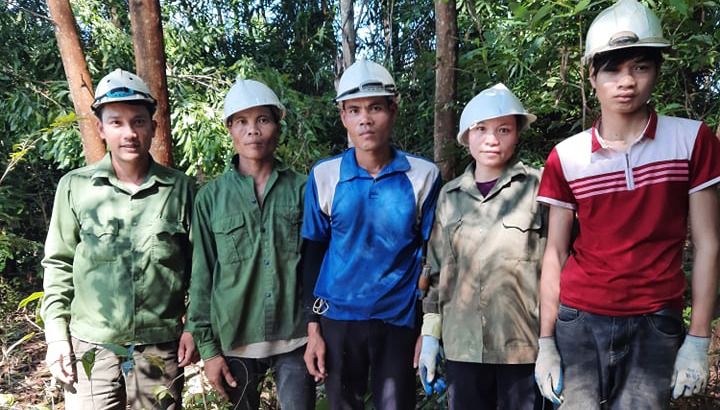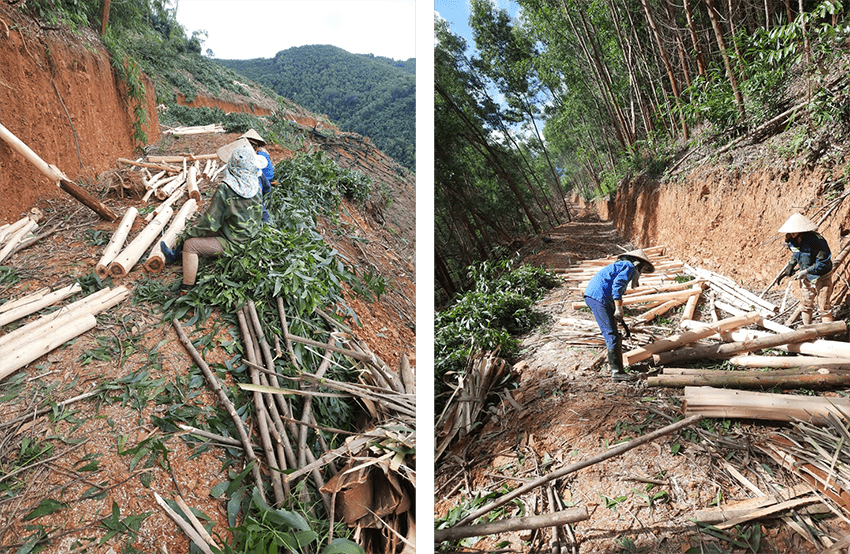

Assessing the potential of biochar in Vietnam’s forestry industry
September 26, 2022

One way the Crawford Fund supports and encourages the next generation of Australians in study, careers and volunteering in international agricultural research is through our highly sought after Student Awards, funded by our State and Territory Committees and made possible by organisations including ACIAR, international centres, Australian and overseas universities and NGOs.
In 2021, we announced 10 tertiary students had won awards to gain international agricultural research experience and expertise. While COVID-19 has caused delays in undertaking some awardees’ work, other students have managed ‘wraparound’ strategies to ensure the work is carried out without the planned travel.
We would like to share the successful ‘wraparound’ experience of Ms Trinh Huynh, a PhD student at the Forest Research Institute, University of the Sunshine Coast who received her Student Award in 2021 for a project assessing the production potential of biochar from biomass residues in plantations in Vietnam.
Trinh’s research, also supported by the ACIAR project FST/2020/123 “Building an effective forest biosecurity network in SE Asia,” aimed to estimate the theoretical potential for biomass residue conversion to biochar by (i) developing allometric equations for estimating the total aboveground biomass of acacia plantations at harvesting age (7 years old) and (ii) estimating the potential of biomass residue for producing biochar.

According to Trinh’s report, biochar produced using modern technologies allows the sustainable conversion of biomass residues (unused biomass) into long-term stable biochar which provides a carbon-rich solid product for various applications. Benefits include:
- improved crop yields and reduced fertiliser requirements
- reduced nutrient leaching, increased water holding capacity and soil organic carbon
- improved soil health and enhanced crop productivity, and
- preventing pest and disease outbreaks by creating healthy and resilient plants.
She noted that Vietnam has about 4.4 million hectares of planted forests across eight regions. The Central Highlands has been planted with around 0.46 million hectares owned by smallholders. Currently, forestry residues from logging, such as bark, branches and foliage are mainly used as firewood (bark and branches) or left in the field and burned. This results in increased release of carbon dioxide into the atmosphere and may contribute to global warming. These biomass residues could instead be used to produce biochar.
“The findings show that collecting forest residues left on the ground of small-scale plantations following harvesting could provide biomass for biochar production, providing income diversification for smallholders, carbon sequestration benefits and potential improvements in tree health,” said Trinh.
“The results provide recommendations for researchers, forestry officers, industry, small landowners, farmers and plantation owners on how to use biomass residues effectively and sustainably and importantly, contribute to smallholder incomes.”
Conducting this project also led to the first-time collaboration between the Forest Science Institute in the Central Highlands Vietnam and the Forest Research Institute at the University of the Sunshine Coast. Successful delivery of this case study also offers insights into the skills and knowledge needed for future collaborations between Australian and Vietnamese institutions.
“Financial support from the Crawford Fund and the ACIAR project was greatly appreciated. I also warmly thank Mohammad-Reza Ghaffariyan, David Lee, Tom Lewis, Madaline Healey, and Simon Lawson for their supervision and for providing key suggestions for improvement of my proposal and final report,” said Trinh.
“I would like to acknowledge support from research collaborators at the Forest Science Institute in the Central Highlands of Vietnam and the Forest Research Institute, University of the Sunshine Coast. Especially, I also would like to thank Nguyen Van Hau, who helped in organising the fieldwork to collect the biomass data. Without help from Hau, I could not finish the data collection due to Covid-19 travel restrictions. Finally, I greatly appreciate the farmers who helped with destructive sampling trees, including Ngan Thi Duyen, Luong Van Ba, Bui Van Duong and Ha Van Hiep,” she concluded.
Read other reports on Trinh’s work:
Forest waste could help fight climate change. University of the Sunshine Coast (UniSC) news – 10 November 2021.
Forest waste could help fight climate change. Noosa Today – 21 November 2021.
Could Forest waste help fight climate change? Waste Management Review – 10 December 10, 2021.




 0
0